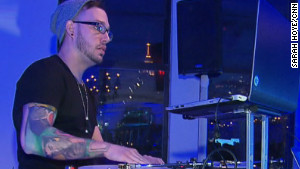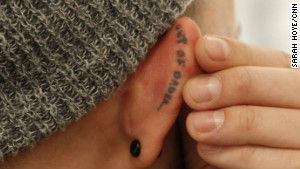- Robbie Wilde lost his hearing due to ear infections as a child
- He refused to go to a special school, learning to read lips instead
- A friend's brother introduced him to the turntables
- Wilde has performed at the Sundance Film Festival and other events
New York (CNN) -- Robbie Wilde thumbs through his iPhone as the sounds of voices and clinking glasses bounce all around him. His eyes never leave the phone's screen.
During New York Fashion Week, Wilde, 27, passes the time with friends and management at an exclusive party in Hell's Kitchen before taking over the turntables.
Wilde lives in a world of rhythm and bass. He just can't hear it.
Ear infections at age 7 left Wilde completely deaf in his right ear and took away 80% of his hearing in his left one.
It would be another four years before doctors would confirm what his mother, Maria Sapeta, dreaded: Her son was deaf.
"It was heartbreaking as a mother," she recalled. "It was probably one of the hardest days of my life. But Robbie was the one who gave me a hug and said, 'Don't cry.'"
Originally from Portugal, Sapeta and her husband, Emidio, then a cruise ship chef, had moved to the United States when Wilde was 5.
From childhood, he always had a "persistent personality," Sapeta said, laughing. Unlike many other kids his age, he always finished what he started -- from puzzles to cabins made from Lincoln Logs.

After losing his hearing, his grades slipped because he had difficulty understanding his teachers. Bullied in school, Wilde usually kept his deafness a secret.
When his parents suggested he attend a specialty school, he insisted on staying in public school. He worked with a speech therapist and began reading lips.
"I grew up in a way that I don't want any sympathy. I don't want to be treated differently," he said. "I just tried to maneuver around, reading lips and trying to hear my own way."
When her son announced he wanted to be a professional DJ instead of joining the family restaurant business, Sapeta was cautiously supportive.
"We could see his talent and his passion, but I kept worrying about that left ear," she said. "Anything to stop his dreams, he didn't want it."
Hearing is the most important sense for a DJ, who manipulates music, scratches records and uses mixers. But Wilde was determined to succeed without his.
Always drawn to music, he discovered turntables in high school through a friend's brother who was a DJ.
Wilde got his first shot at performing as a DJ at his father's restaurant outside Newark, New Jersey, nearly a decade ago, and he hasn't looked back since.
"I still consider it as a hobby. I really do love it," Wilde said. "I don't see it as a job, and that's the best part."
Wilde started out playing CDs before pushing himself to scratch records, something he knew he needed help with.
"It's a hard business alone for the hearing community," he said, "And I was like, 'I'm hearing impaired and how's that going to work?'"

So he paired up with two-time DMC world champion DJ and Harvard math grad Sam Zornow, aka DJ Shiftee, who was teaching at Dubspot, a DJ school and production studio in New York.
Mastering turntables is a skill that takes hours of practice to learn and can be a lifelong pursuit, Zornow said.
"It takes two years just to get bad," he said. "And I mean 'bad' meaning bad."
Still, Zornow was up to the challenge of working with Wilde. At first he didn't know what to expect, but he said Wilde's success has surprised him.
"On paper it should be impossible. You're dealing with manipulating sound. Then combine that with a discipline that's hard in general, it's a really impressive task he's taken on," Zornow said. "From the beginning he believed in himself and continues to believe in himself."
Computer giant Hewlett-Packard noticed Wilde's skills and put him in a commercial this fall for its new touch-enabled PC, thrusting him onto the world stage. (watch it here on YouTube)
"It's a true story of inspiration," said HP marketing executive Danielle Jones. "His is a profound story of someone being able to do the things that matter to them and the things that they love through technology."
Unable to hear lyrics or complete compositions, Wilde relies on technology to see the music by using his laptop and DJ software that helps him differentiate between vocals, bass and kicks.
Robbie Wilde
He also feels the vibration whether physically from a club's speakers or through a SubPac, which resembles a seat cushion and allows him to feel the music by directly transferring low frequencies to the body.
Clubgoers and promoters dubbed him "That Deaf DJ" after he first came onto the scene in New Jersey -- a moniker even he uses. But Wilde said he wants to be more than just "a deaf kid trying to DJ."
"I want you to see me as a great DJ who happens to be deaf," he said.
Besides, he said, some things are better left unheard.
"There's a lot of sounds out in the world you don't want to hear. I like it muffled," he said. "I like who I am; I'm proud of who I am."
Wilde has gone from working small clubs to rocking this year's Consumer Electronics Show and Sundance Film Festival.
When he's not behind the turntables, Wilde is in the studio producing music.
Often questioned about the severity of his deafness, Wilde used to carry around a doctor's note and would show the back of his driver's license indicating his hearing impairment.
When people question his abilities, he said he has only one answer: "I didn't hear you."